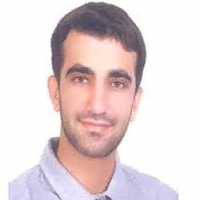
Mahdi Jafari
Work place: SanatkadeheSabze Pasargad Company (S.S.P. Co), Shiraz, Iran
E-mail: ssp.robotic@gmail.com
Website:
Research Interests: Robotics, Artificial Intelligence
Biography
Mahdi Jafari is a communication and electrical engineer researcher at research and development company SSP. Co. He is now pursuing his Master in communication engineering at Shiraz University. His research activities deal with the robotics and artificial nonlinear control.
Author Articles
Design High Efficiency Intelligent Robust Back stepping Controller
By Kamran Heidari Farzin Piltan Samaneh Zahmatkesh Sara Heidari Mahdi Jafari
DOI: https://doi.org/10.5815/ijieeb.2013.06.03, Pub. Date: 8 Dec. 2013
The increasing demand for multi-degree-of-freedom (DOF) continuum robot in presence of highly nonlinear dynamic parameters in a number of industries has motivated a flurry of research in the development of soft computing nonlinear methodology. This research contributes to the on-going research effort by exploring alternate methods for controlling the continuum robot manipulator. This research addresses two basic issues related to the control of a continuum robots; (1) a more accurate representation of the dynamic model of an existing prototype, and (2) the design of a robust feedback controller. The robust back stepping controller proposed in this research is used to further demonstrate the appealing features exhibited by the continuum robot. Robust feedback controller is used to position control of continuum robot in presence of uncertainties. Using Lyapunov type stability arguments, a robust back stepping controller is designed to achieve this objective. The controller developed in this research is designed into two steps. Firstly, a robust stabilizing torque is designed for the nominal continuum robot dynamics derived using the constrained Lagrangian formulation. Next, the fuzzy logic methodology applied to it to solution uncertainty problem. The fuzzy model free problem is formulated to minimize the nonlinear formulation of continuum robot. The eventual stability of the controller depends on the torque generating capabilities of the continuum robots.
[...] Read more.Nonlinear Fuzzy Model-base Technique to Compensate Highly Nonlinear Continuum Robot Manipulator
By Farzin Piltan Mehdi Eram Mohammad Taghavi Omid Reza Sadrnia Mahdi Jafari
DOI: https://doi.org/10.5815/ijisa.2013.12.12, Pub. Date: 8 Nov. 2013
Refer to this research, a gradient descent optimization methodology for position fuzzy- model based computed torque controller (GDFCTC) is proposed for highly nonlinear continuum robot manipulator. The main problem of the pure computed torque controller (CTC) was equivalent problem in uncertain systems. The simulation results exhibit that the CTC works well in certain system. To eliminate the continuum robot manipulator system’s dynamic; Mamdani fuzzy inference system is design and applied to CTC. This methodology is based on applied fuzzy logic in equivalent nonlinear dynamic part to estimate unknown parameters. This relatively controller is more plausible to implement in an actual real-time when compared to other techniques of nonlinear controller methodology of continuum arms. Based on the gradient descent optimization method, the PD-gain updating factor has been developed in certain and partly uncertain continuum robots. The new techniques proposed and methodologies adopted in this paper supported by MATLAB/SIMULINK results represent a significant contribution to the field of design an optimized nonlinear computed torque controller for continuum robots.
[...] Read more.Design Modified Fuzzy Hybrid Technique: Tuning By GDO
By Mohammad shamsodini Farzin Piltan Mahdi Jafari Omid Reza Sadrnia Omid Mahmoudi
DOI: https://doi.org/10.5815/ijmecs.2013.08.07, Pub. Date: 8 Aug. 2013
The Proportional Integral Derivative (PID) Fuzzy hybrid (switching mode computed torque sliding mode) Controller is presented in this research. The popularity of PID FHC controllers can be attributed to their robust performance in a wide range of operating conditions and partly to their functional simplicity. The process of setting of PID FHC controller can be determined as an optimization task. Over the years, use of intelligent strategies for tuning of these controllers has been growing. Biologically inspired evolutionary strategies have gained importance over other strategies because of their consistent performance over wide range of process models and their flexibility. This paper analyses the manual tuning techniques and compares the same with Gradient Descent tuning methods for tuning PID FHC controllers for flexible robot manipulator system and testing of the quality of process control in the simulation environment of MATLAB/SIMULINK Simulator.
[...] Read more.Design Artificial Intelligence-Based Switching PD plus Gravity for Highly Nonlinear Second Order System
By Farzin Piltan Mahdi Jafari Mehdi Eram Omid Mahmoudi Omid Reza Sadrnia
DOI: https://doi.org/10.5815/ijem.2013.01.04, Pub. Date: 29 Jun. 2013
Refer to this research, an intelligent fuzzy parallel switching Proportional-Derivative (PD) plus gravity controller is proposed for highly nonlinear continuum robot manipulator. Design a nonlinear controller for second order nonlinear uncertain dynamical systems is one of the most important challenging works. In order to provide high performance in nonlinear systems, switching partly sliding mode plus gravity controller is selected. Pure switching partly sliding mode plus gravity controller can be used to control of partly known nonlinear dynamic parameters of continuum robot manipulator. Conversely, this method is used in many applications; it must to solve chattering phenomenon which it can cause some problems such as saturation and heat the mechanical parts of continuum robot manipulators or drivers. In order to solve the chattering phenomenon, implement easily and avoid mathematical model base controller, Mamdani’s performance/error-based fuzzy logic methodology with two inputs and one output and 49 rules is parallel applied to pure switching partly sliding mode plus gravity controller. The results demonstrate that this method is a model-free controllers which works well in certain and partly uncertain system.
[...] Read more.Other Articles
Subscribe to receive issue release notifications and newsletters from MECS Press journals